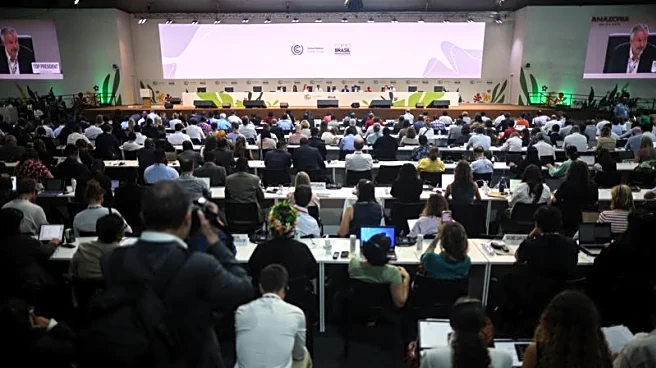By Simon Jessop
BELEM, Brazil (Reuters) -Despite the U.S. government souring on the global climate agenda ahead of the COP30 summit, American companies did not shy away.
A Reuters analysis of attendance
lists shows there were 60 representatives of Fortune 100 companies at the Brazil event, compared with 50 at last year's in Baku, Azerbaijan. Still others attended pre-conference events in Brazil's finance hub Sao Paulo and in Rio de Janeiro.
Tech firms including Microsoft and Google, energy company Occidental Petroleum, carmaker General Motors and lender Citigroup were among those represented on a provisional U.N. list of attendees of the official summit.
"We've seen no discernible change in the engagement of U.S. companies on climate policy over the course of this year. And that was certainly reflected in attendance levels," said Andrew Wilson, deputy secretary general for policy at the International Chamber of Commerce.
"We are also seeing growing concern across industry about the growing costs of extreme weather events — underscoring the need for effective policy responses."
Executives said they didn't think now was a good time to opt out of the climate conversation, with rising temperatures unleashing ever more threats to factories, supply chains and the bottom line.
"We're doing it because it's good for the business. It helps create supply security," said PepsiCo Chief Sustainability Officer (CSO) Jim Andrew on the sidelines of the talks.
"We need farmers to be successful, we need them to keep farming," he added, given the company makes the bulk of its revenues from foods including Walkers Crisps and Quaker Oats.
FILLING THE VOID
Darren Woods, the boss of top U.S. oil company ExxonMobil was among the U.S. executives, mayors and other sub-national leaders who attended the pre-COP events.
All those players have an important role in the future of climate action, according to Lou Leonard, Inaugural Dean of Clark University's School of Climate, Environment, and Society.
Existing policies from federal and non-federal actors would lead to a 35% reduction in U.S. emissions by 2035, a recent analysis led by the Center for Global Sustainability (CGS) at the University of Maryland showed.
Much of that is being driven by companies.
"Despite the headlines, the private sector continues to invest in and deploy clean energy," said Gina McCarthy, former administrator of the U.S. Environmental Protection Agency and now Managing Co-Chair of 'America Is All In', a coalition of non-federal leaders.
"Last year, clean energy jobs in the U.S. expanded three times faster than the rest of the nation's workforce."
The two-week-long COP30 conference also included many smaller U.S. companies in sectors set to profit from the world's shift to low-carbon energy, including in carbon markets.
"Being here is about connecting globally," said Brennan Spellacy, chief executive at carbon credits platform Patch, "Most of my meetings here are with English, French, and German sustainability leaders and CSOs."
U.S. COMPANIES HAVE A CRUCIAL ROLE
President Trump has called climate change a hoax. But regardless of the U.S. federal position, regulations are changing across the world to hasten the energy transition even though the final deal at COP30 disappointed some.
"Irrespective of what's coming out of the United States, in terms of rhetoric, the market is moving (and) policymakers are recognising the direction of travel," said Jack Hurd, head of both the World Economic Forum's Earth System Agenda and the Tropical Forest Alliance.
More U.S. companies are also disclosing their climate strategies despite the U.S. dropping plans for a federal rule requiring it, although the quality of plans from companies across the globe remains low, data from disclosure platform CDP showed.
Whether they were at the main event or not, the fact U.S. companies appeared was significant, said Maria Mendiluce, CEO at the We Mean Business Coalition.
"The U.S. has a decisive role in global climate, energy and industrial policy, so sub-national leaders, non-state actors and businesses showing up at COP30 matters."
"Even when domestic politics are unsettled, the U.S. shapes markets, capital flows and technology pathways. Its engagement signals to investors that the world's largest economy understands the competitiveness, innovation, security and supply-chain stakes of the energy transition."
(Reporting and Writing by Simon Jessop; Editing by Richard Valdmanis and Katy Daigle)










